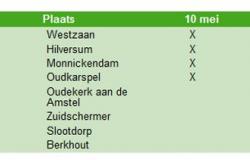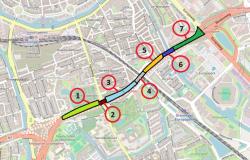After yet another reorganization, it was inevitable in 2019. Monica Keyzer, editorial assistant for Vrij Nederland (VN) from 1978, was also fired. Her hours had already been cut back. She then patiently counted down for five years until the time had come: early retirement. And now (‘Thank God’, Keyzer sighs) the time has finally come. The ‘official’ state pension will then follow in the summer.
If you listen carefully to Keyzer, you will hear that she sometimes misspokes. This week she had a funeral a colleague – she speaks about it in present tense, as if she still works there. Later, without being aware of it, she will speak of ‘we’ of Vrij Nederland several times.
As Keyzer himself says: ‘My life began in 1978’. That year she applied for a job at the magazine, which was then still published as a newspaper. Why exactly she was hired remains a mystery to her. The choice was a huge one for the UN editors: fifty applications had been received.
The fact that the editors were looking for a ‘spirited aunt’ and that she herself had no intention of advancing to the position of writing editor may have contributed to this, Keyzer suspects. ‘From that moment on I was home.’
In a café on Amsterdam’s Van Baerlestraat (Keyzer rarely leaves the city limits of Amsterdam and, if necessary, with some reluctance) she talks about the illustrious past of Vrij Nederland as if it were yesterday.
Also read: ‘Spicy lady’ Monica Keyzer left Vrij Nederland after 41 years
I met you for the first time last summer. After that conversation you asked if you could pass my name on to the UWV. Was that awkward?
‘After my dismissal, I was required to apply for a job by the UWV. First I sent job applications. Then I discovered that you can also have “network conversations” and give them up. I did that well. I experienced it as a humiliation to ask people.’
Did that work?
‘In one year I collected fifty names. And of course they don’t check. I needed to put a check mark next to my name in the system. I do everything for money. I put all my principles aside. Maybe I can become prime minister too, if they ask me.’
Reorganizations were not new at UN. Did you sit with your buttocks clenched every time?
‘It was my turn once before. That decision was later reversed. Eventually the cheese slicing method came: everyone had to give in. The number of working hours continued to decline. During the last reorganization we talked about it for six months and inspected all the books. We just cost too much. Ultimately it was no longer enforceable.’
2015: The editorial staff of Vrij Nederland holds a farewell drink in the editorial room on the Raamgracht (a former secret church). The editorial staff is moving to Wibautstraat. Editor-in-chief Frits van Exter gives a speech. Photo: Dingena Mol / Hollandse Hoogte.
How did you end up at Vrij Nederland?
‘My teacher at school always talked about those good articles from Vrij Nederland. I took out a subscription with my pocket money, with a CJP discount. I thought that was a useful expenditure. I first worked as a receptionist at the Dutch Association of Bookbinders Patrons. Everyone there was very right-wing, people sat in that office as if they were all in charge. I thought: “I want to get out of here and go somewhere on the left.”’
Did you pass the balloting?
‘I was still young and cheap. And they thought I came across as tough. I was the assistant in the secretariat, did all the shitty jobs. At the same time, the boss allowed us to read the newspapers for one hour in the morning before the editorial office filled up. For one hour! I thought that was such a luxury…’
The vacancy from Het Parool that Keyzer applied for in 1978. Photo: Monica Keyzer archive.
A luxury, indeed.
‘I read those newspapers because an hour later the editors came rushing in like a pack of young dogs. I had to stay informed. The editors – mostly male – loved explaining things. I often pretended to be stupid on purpose. Many older editors liked to talk about the past, the war. All those men were like fathers to me.’
And you offered them a listening ear?
Sober: ‘Their girlfriends and wives stopped listening to them.’

Monica Keyzer’s last working day at Vrij Nederland in 2019. Kissed by ‘the Sanders’: Sander Pleij and Sander Donkers. Photo: Monica Keyzer archive.
The criminals were very nice by the way. They came by with huge cars and threw the money on the counter. “Do you want change?” I asked. “No joke,” they replied
I heard that you played a key role in keeping the newsroom at bay.
Grinning: ‘I was even selected for that. We were popular at the time, which attracted a lot of… weirdos. My other colleague Paula Glerum enjoyed talking to them. I had no patience for that. We had enough incidents: angry squatters, criminals, Hell’s Angels.
The criminals were very nice, by the way, they came to pick up an issue of the magazine. They came by with huge cars and threw the money on the counter. “Do you want change?” I asked. “No joke,” they replied. While the rich people from the South started arguing about money.’
That never went wrong?
‘One gentleman was very angry about an article about conditions in Suriname. He came to tell me a story and threw me against a wall. Offended I was.’ Laughing: ‘I was still slim then, he could easily push me to the side.
Once there was a man on the phone, a dangerous lunatic. He threatened to drop by the newsroom. ‘Gut whore, he called me.’
I can tell from the look on your face that you weren’t happy with that.
Hits the table: ‘Kraut whore!? How old did he think I was!’ Later: ‘Well. The war and Free Netherlands, founded by the resistance, were a bit sensitive, weren’t they?
I heard from former colleagues that they regarded you as the mother of the editorial team.
‘That is the role I took over from my former colleague, Paula, from the secretariat. I didn’t like it. The colleagues were getting younger and younger. When I was introduced to someone, he said, “Oh, you’re the same age as my mother.”
‘Arguing is part of Vrij Nederland’, was the headline in NRC once. The same newspaper spoke of a ‘civil war’ among rival editors. It shouldn’t have been all roses and moonshine.
‘It was a very large editorial office, with many roosters, er, men. At the same time there was competition with other magazines. We wanted to be the first, the best and the most beautiful. That attracted a certain kind of people. There were camps in the editorial office, people who fought each other in editorial meetings. A lot of internal stuff leaked out.”

1981: Vrij Nederland and Het Parool, both emerged from the resistance during the Second World War, are sold at Central Station in Amsterdam. Photo: Hans van den Bogaard/Hollandse Hoogte.
And you were supposed to keep the peace?
‘We, the secretariat, were neutral, we were Switzerland. You could cry with us. Of course we had a lot of opinions, we just weren’t a party.’
Do you still read Vrij Nederland?
‘When I left I negotiated a free subscription — it was recently renewed again. I don’t read everything. I find the design dramatic, yes. I don’t want to say that VN is a love for me, I think it is something that belongs to me.’
There is a pause. Keyzer looks at the menu, peers at the group opposite him, and asks: ‘Do you want bitterballen?’. To the waitress: ‘A portion of bitterballen.’
‘I don’t know if it will work with the new UN. With such an editorial team you are dependent on what people offer. You can’t say to freelancers: are you going to make this.’
Did they do that at the ‘old’ UN?
‘All the editors-in-chief I met wanted that. But it never worked. Because every editor had his own thing. Everyone had their own hobbies, agendas, situations. There were also many arguments about that. At a newspaper you can say: “We are now all going to sit on top of Ukraine”.’
She sighs, eats one of the bitterballen that have just arrived. ‘But the boys didn’t do that.’

Former editor-in-chief Rinus Ferdiandisse with the anniversary edition of Vrij Nederland on its fiftieth anniversary in 1990. Photo: ANP/photographer unknown.
Did that frustrate you?
‘“God damn it, you pay the salaries of those editors, then you can make demands, right?”, I often thought about the editors-in-chief. There were many islands. People who did their own thing and thought “I don’t care what others think about it”.’

The editorial secretariat of Vrij Nederland in 1982 with sitting in the photo from left to right: Paula Glerum and Beatrix Legerman. Photo: Monica Keyzer archive.
Should that have been done differently?
‘I would have liked it a little stricter, yes.’
At the same time, circulation continued to decline and the leak was not found. The number of reorganizations cannot be counted on one hand.
‘Managers and lengthy reports arrived talking about “titles”, “brands” and…’
Keyzer makes a disgusted face: ‘FTEs… Full-time Equivalents…’
At the same time we suffered from a huge ostrich policy
Those people did try to save VN. Didn’t you dig your heels in?
‘These managers disguise themselves in a certain language, it is a kind of dehumanization. You may well say: “An editorial team may not exceed twenty people or editors,” but the term “20 FTEs“, that gives me the creeps. In a sense, efficiency has gone too far. It was about numbers instead of people.
‘At the same time we suffered from a huge ostrich policy. When we saw budget overruns we always thought: “Oh well…”, with the advent of computers and Excel we received a schedule every day of how things are going. You couldn’t ignore it anymore.’

Monica Keyzer with then editor-in-chief Frits van Exter at their offices on the Raamgracht in Amsterdam. Photo: Monica Keyzer archive.
Then what was your method to save UN?
‘Editors were always busy with the competition. “What does HP/Time have?” But I don’t think it was about what the competition did, it was about the content. You have to create a magazine that is so beautiful that people want to read it. People have a certain amount of time, you have to be worth someone’s time. And nowadays there is a lot more competition. De Correspondent, De Groene, the newspapers. But I still don’t like De Groene. They can never put points behind stories.’
De Groene writes black figures and is growing in readership.
‘They have a much better structure when it comes to how the company is put together. We always had a lot overhead costs, even when we had many subscribers we went over budgets.’
‘Miss Free Netherlands‘, is your nickname. I’m told your house is some kind of glorified UN museum. Will you take the magazine to the grave with you?
Doubtful: ‘I hope VN still exists when I die. Next week there will be a farewell party for outgoing editor-in-chief Ward Wijndelts. It feels like one end of an era. Nowadays I only see former colleagues at cremations. It would be nicer if I saw them again at parties, instead of just at funerals.’
Tags: Monica Keyzer editorial assistant Vrij Nederland retired
-











